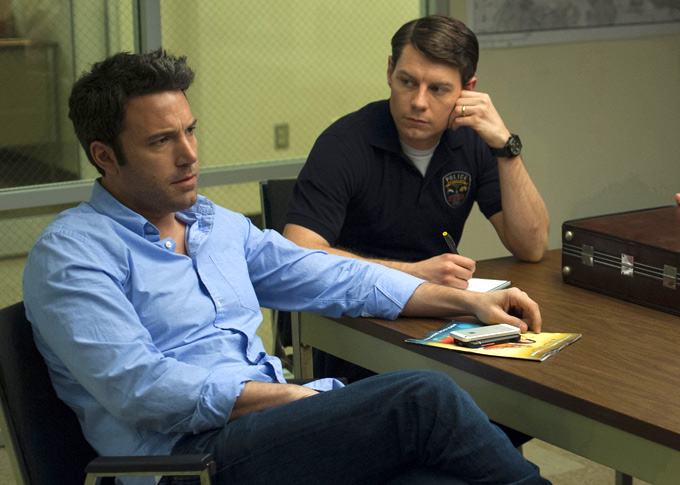Some feared that turning Gillian Flynn's bestselling novel into a movie couldn't be done, but with Flynn herself in the screenwriter's chair and the clinically precise David Fincher wearing the director's hat, it's turned out a treat. It's long at 145 minutes, but it needed space to accommodate its titillating mix of police procedural, whodunnit, social satire and psychological drama.
Gone Girl is the story of the marriage of Nick and Amy Dunne, a pair of high-profile journalists whose blissfully gilded Manhattan existence has been brought to a shuddering halt by an economic recession which has left them both jobless. They've ended up beached in the fictional blanksville of North Carthage, Missouri, Nick's home town, where his dementia-afflicted dad is in a care home and Nick runs a bar (called The Bar) with his bracingly foul-mouthed twin sister Margo (Carrie Coon). In Ben Affleck's nicely-controlled portrayal, Nick is amiable, cynical and a bit of a beer-drinking slob, and incidentally unable to resist the lissome allure of a young journalism student (Emily Ratajkowski).
It depicts marriage as a trap which grips tighter the more you try to escape it
The thrill is gone from the marital bed, especially for Amy (Rosamund Pike), an Ivy League graduate whose aura of infinite potential makes you feel she should be editing Tatler or running a hedge fund. The product of pushy, self-regarding parents who used her as raw material for their fictional children's stories about "Amazing Amy", she thrums with intelligence and ambition, not to mention fearlessly upfront sexuality (Pike's icy brilliance might have been specifically designed for the role). When she goes missing from home on the couple's fifth wedding anniversary, leaving a shattered table and signs of a bloody struggle, Nick is shocked and confused, not least because he's seen enough episodes of CSI to realise that the husband is bound to be the chief suspect.
The elaborately wrought tale unfolds through the device of double unreliable narrators, with Nick's in-the-present account of his life with Amy counterpointed by her version as told through a diary discovered during the police investigation. Kim Dickens plays lead detective Rhonda Boney like a postmodern Marge Gunderson from Fargo, studying Nick with an increasingly critical eye as he reveals how startlingly little he knows about his wife's life, even while she has been funding his own with the remnants of her trust fund. He feels the figurative noose tightening around his neck when Amy's diaries disclose her fear of her husband, so much so that she felt it necessary to buy a gun.
 Fincher smartly contrasts Nick's incomprehending bemusement against the damning spider-web of Amy's account (augmented by her trail of cunning wedding-anniversary clues), and he has a ball with the media's handling of what soon balloons into a great national furore. The commentators waste no time in packaging Nick up for Death Row, while cable TV host Ellen Abbott (Missi Pyle) flays him with a hysterical trial-by-TV. Much black humour is extracted from the way Nick's unfamiliarity with the rules of social media trap him into a string of damaging selfies and inappropriate poses. Finally realising that life-threatening sensationalism can only be fought with brazen image manipulation, Nick hires the slick celebrity lawyer Tanner Bolt (Tyler Perry), a master of the black arts of TV presentation and public confession.
Fincher smartly contrasts Nick's incomprehending bemusement against the damning spider-web of Amy's account (augmented by her trail of cunning wedding-anniversary clues), and he has a ball with the media's handling of what soon balloons into a great national furore. The commentators waste no time in packaging Nick up for Death Row, while cable TV host Ellen Abbott (Missi Pyle) flays him with a hysterical trial-by-TV. Much black humour is extracted from the way Nick's unfamiliarity with the rules of social media trap him into a string of damaging selfies and inappropriate poses. Finally realising that life-threatening sensationalism can only be fought with brazen image manipulation, Nick hires the slick celebrity lawyer Tanner Bolt (Tyler Perry), a master of the black arts of TV presentation and public confession.
 There are as many layers in Gone Girl as you care to find. It hints at a lineage of noir-ish thrillers from Double Indemnity to Presumed Innocent with a shot of Patricia Highsmith for good measure, while being as knowingly and carelessly contemporary as Twitter and the iPhone 6 (Fincher, after all, directed both Seven and The Social Network). It depicts marriage as a trap which grips tighter the more you try to escape it, but also as a highwire battle of wits which demands that both partners must be at the top of their game. An episode featuring Amy and her obsessed ex-lover Desi (Neil Patrick Harris, a nearly-dead ringer for Niles Crane) offers a chilling alternative vision of true love as round-the-clock surveillance in a state-of-the-art cage. It's cool, dark and treacherous, but often laugh-out-loud funny. And undoubtedly worth seeing more than once.
There are as many layers in Gone Girl as you care to find. It hints at a lineage of noir-ish thrillers from Double Indemnity to Presumed Innocent with a shot of Patricia Highsmith for good measure, while being as knowingly and carelessly contemporary as Twitter and the iPhone 6 (Fincher, after all, directed both Seven and The Social Network). It depicts marriage as a trap which grips tighter the more you try to escape it, but also as a highwire battle of wits which demands that both partners must be at the top of their game. An episode featuring Amy and her obsessed ex-lover Desi (Neil Patrick Harris, a nearly-dead ringer for Niles Crane) offers a chilling alternative vision of true love as round-the-clock surveillance in a state-of-the-art cage. It's cool, dark and treacherous, but often laugh-out-loud funny. And undoubtedly worth seeing more than once.
THE BEST OF ROSAMUND PIKE
A United Kingdom. Love, race and power politics under African skies
Barney's Version. Pike plays the third wife as novelist Mordecai Richler makes a mostly welcome return to the screen
Jack Reacher. Pike survives the famous curse of Cruise
Made in Dagenham. Pike almost steals a warm-hearted comedy about ladies striking for equal pay
Women in Love. A BBC Four adaptation starring Pike and Rachael Stirling does not get over The Rainbow
PLUS ONE TURKEY
Thunderbirds Are Go. Pike voicing Lady Penelope cannot save the day for ITV reboot
Overleaf: watch the trailer for Gone Girl

 Fincher smartly contrasts Nick's incomprehending bemusement against the damning spider-web of Amy's account (augmented by her trail of cunning wedding-anniversary clues), and he has a ball with the media's handling of what soon balloons into a great national furore. The commentators waste no time in packaging Nick up for Death Row, while cable TV host Ellen Abbott (Missi Pyle) flays him with a hysterical trial-by-TV. Much black humour is extracted from the way Nick's unfamiliarity with the rules of social media trap him into a string of damaging selfies and inappropriate poses. Finally realising that life-threatening sensationalism can only be fought with brazen image manipulation, Nick hires the slick celebrity lawyer Tanner Bolt (Tyler Perry), a master of the black arts of TV presentation and public confession.
Fincher smartly contrasts Nick's incomprehending bemusement against the damning spider-web of Amy's account (augmented by her trail of cunning wedding-anniversary clues), and he has a ball with the media's handling of what soon balloons into a great national furore. The commentators waste no time in packaging Nick up for Death Row, while cable TV host Ellen Abbott (Missi Pyle) flays him with a hysterical trial-by-TV. Much black humour is extracted from the way Nick's unfamiliarity with the rules of social media trap him into a string of damaging selfies and inappropriate poses. Finally realising that life-threatening sensationalism can only be fought with brazen image manipulation, Nick hires the slick celebrity lawyer Tanner Bolt (Tyler Perry), a master of the black arts of TV presentation and public confession. There are as many layers in Gone Girl as you care to find. It hints at a lineage of noir-ish thrillers from Double Indemnity to Presumed Innocent with a shot of Patricia Highsmith for good measure, while being as knowingly and carelessly contemporary as Twitter and the iPhone 6 (Fincher, after all, directed both Seven and
There are as many layers in Gone Girl as you care to find. It hints at a lineage of noir-ish thrillers from Double Indemnity to Presumed Innocent with a shot of Patricia Highsmith for good measure, while being as knowingly and carelessly contemporary as Twitter and the iPhone 6 (Fincher, after all, directed both Seven and